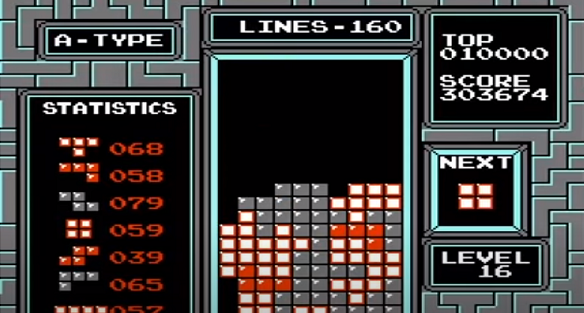
At the onset of 8-bit video gaming technology as a natural progression of the legendary Pong interface and the future shock nightmare of personalized immersion within the digital paradigm, the programmable metaphors in the electronic dreamworld were already apparent. Real life was crudely, yet deftly emulated within electronic language that allowed for eight separate states of imaginary existence leading to a revolution not directly correlating with physical matter.
While the Atari gaming console yielded to the daunting processing power at the time of the original Nintendo Entertainment System (NES) in the late 1980’s, the foreseeable future was apparent within the meticulous binary representation of a realm, or a world dictated by the basic laws of Thermodynamics. Even though Super Mario Brothers was launched as a resounding infusion of role playing intrinsic fantasy worlds, the strategy games of the time paved the road for what now is construed and defined as AI through the misunderstood lexicon of analytics and specific modeling. The resulting ramifications of which have shaped both diplomacy and society through simply mastering an involved and esoteric game of Tic-Tac-Toe.
As the current subjective and prominently selective crises continues to pervade in the widely misnomer of the Middle East, embarking on a time machine four decades into the past is not merely the antithesis of a Ray Bradbury classic short story of temporal reverence, yet a bitingly ironic example of just how poignant and elicit the lessons of history can be.
While the debate of history pertaining to the future, or the past dictating the present remains a prominent example of certain sects of humanity defining truth, literally fitting pieces of the digital puzzle into an effective and adroit illustration of life, is the precursor to the current state of articulated chaos that dictates the ebb and flow of life and circumstances that are largely ambiguous to the basic precipices challenging optimism and sensibility. The footprint of the gaming world on the various channels of federal government, embassies, and consulates is in-depth and profound.
The brainchild of Soviet Cold War operator and software engineer Alexey Leonidovich Pajitnov, Tetris is the cultural and mainstream archetype as the “wait and see period” before the burgeoning and frenzied logarithmic explosion that resulted in the age of the internet. Launched in the mid-1980’s, and ironically birthed in Russia, the game combines analytical abilities along with fast-twitched neurons and synapses to provide the ultimate entertainment experience in allowing for contrived randomness to mold and predict the decision making tree of organizations attempting to dictate the near future and navigate through the distant abysses of the past.

The original Tetris gaming interface developed by Alexey Leonidovich Pajitnov
Confining, and at the same time liberating, in an ecosystem that rivals oblectation, the rigid, yet dazzlingly mesmerizing nature of the 8-bit NES cartridge experience pioneered the simulation of groupthink, or in the modern sense tribalism. Cerebral thought patterns were approximated through non-machine learning innovation which was literally child’s play for an entire generation. The subsequent dichotomy is both a critique of evolution, and the human condition of Nihilism. While straining to shed to cocoon of servitude to the implacable restraints of inevitability, a template was released for liberation, through collaboration. Or at least a brief respite, against the rigors of existence.
Tetris reinforces that data has shape and is contoured, and gives to the end-user hope that fate is not predetermined on one level, yet on another plane can be applied to gross negligence in forcing the delivery mechanisms of information in creating stringent rules of engagement and interaction through the limitations of both the platform and video game in its perpetuity. The platform limits the chaos of Westernization in the absence of purpose. When applied to war games, or games of war, the application to effectively address societal diplomatic indiscretions or oversights is innovatively constrained. In the case of Tetris, the shear number of clones to the game indicates the impact on diplomatic and strategic channels.
While pixilated 8-bit video promotes the ability for pattern recognition, nuance is embraced and logic at least within the borders of limited optics in attempting to solve ingrained issues creates an atmosphere of obliviousness which benefits the majority, yet is blind to a laser sharp evaluation of processing information. While laissez-faire and the freedoms of the West should be continually celebrated and applied to everyday life, defining parameters are still needed to ensure efficiency.
With situational awareness as an Utilitarian trait of fostering free will, the existence of the archaic gaming systems at least has influenced a generation policy architects until the smart entertainment consoles of contemporary trending allure reconstruct the lizard facets of the human brain. Scoring a Tetris (eliminating four lines at once) evokes a “Butterfly effect”, the side effects which may not be witnessed for years.